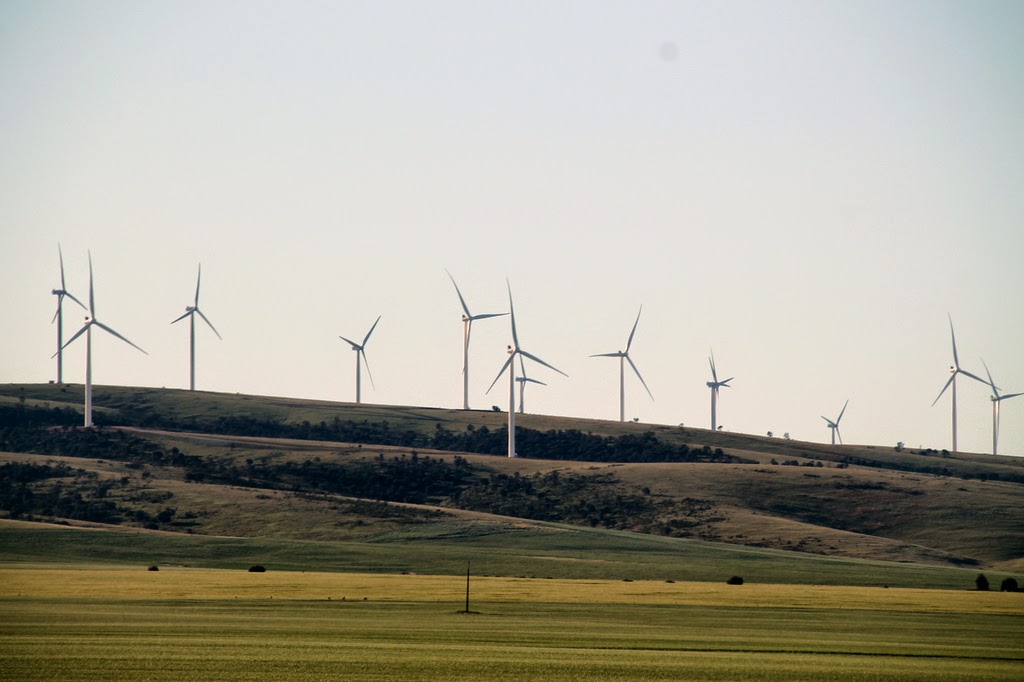Road tripping really isn’t my thing. Melbourne and back in
one day is a stretch for me. So it was with some trepidation that I agreed to a
12 day round trip to Alice Springs during these holidays.
While we were at the Grand Canyon in 2012, we realised that
we've neglected a couple of big ticket, bucket list items in our own country. So,
last year we snorkeled on the Great Barrier Reef and this year it’s time to
visit ‘the Rock’.
With our favourite travel buddies, Lyle, Mark & Maddy and
a couple of our gorgeous exchange students, Yuri & Florence in tow, we set
off on an adventure.
The trip from Mortlake to Adelaide is a fairly familiar one
and pretty enough at this time of the year. The South West is a carpet of golden
canola that gives way to pretty vineyards as you pass through the Coonawarra but beyond Adelaide was new territory for all of us. Here the farming turns into
olive groves and hot house tomatoes and caged hens, serviced by giant rows of wind turbines marching like triffids over the horizon. It's still green and lush, with no hint of the desert that lies beyond.
Port Pirie is a stopover rather than a destination. We got
there just in time to have a quick wander in town before we grabbed some cooked
chickens from the supermarket for dinner and settled in to a handy 3 bedroom
cottage at the Travelway Motel.
From Port Pirie to Port Augusta it's a short drive alongside the Spencer Gulf. As you leave Port Augusta, you start to get some feeling of
the vastness of the outback but it’s only when you’ve been driving for five or
six hours through the desert that you really start to appreciate just how empty
this part of the country is. Passing the Flinders Ranges on our right hand side we saw our first 'Outback' sign.
The Stuart Highway is a red band of civilization that joins
Adelaide to Darwin. The scenery is unchanging. Red dirt and bush scrub; the
sides of the road littered here and there with ‘deflated’ animals; cattle,
kangaroos and the odd camel. Signposts point to homesteads 40 and 50 km off the
beaten track, leaving you shaking your head with wonder at the resilience of
the people who live in this barren landscape.
We drove the 6 km off the highway to visit Woomera, a once
thriving army base of the mid 20th century. This purpose built town
is almost empty now but the remnants of its heyday remain. A space museum, civic theatre,
area school, and street after street of (mostly) empty 60’s style bungalows.
There’s even a bowling alley and a baseball field, legacy of the US army troops
who lived there at one stage. An information centre reveals the history behind
this quaint place and a look at the local newsletter reveals a lively community
still exists out here in the middle of nowhere.
From Woomera we pushed on, arriving in Coober Pedy just as
our onboard fuel computer indicated we were out of gas! Coober Pedy is a giant
mullock heap and looks like the set of a Mad Max movie. The main street is a
collection of opal shops, some shabbier than others. We stayed in an
underground hotel, a test of resilience for my claustrophobic husband. It was a
weird feeling to be in a room without windows (and not much air!) Apparently
the temperature is a constant 24 C all year round underground. I’m sure that’s
great in the Winter but it was a bit warm for comfortable sleeping. We watched the sunset from the top of our motel and for dinner
we bought pizza from Jack’s and it absolutely lived up to its reputation as the
best in town.
We were on the road again early the next morning and it soon
became apparent just how vast this country really is. It’s 688 km from Coober
Pedy to Alice Springs with just a couple of roadhouses in between. Coming out
of Coober Pedy the landscape is interesting because of the opal mining. Thousands
of pointy mounds of sandy dirt of varying sizes lay testament to unsuccessful
attempts to find the beautiful, opalescent stone that the area is famous for
but within a few kilometres we were once again in the scrub. Despite the
sameness of the landscape, there are also differences. The closer you get to
Alice, the bigger the trees get and the more ‘normal’ the scenery. This is what
I was expecting, what I remember from childhood text books and Albert Namatjira
paintings. Red dirt, rocky outcrops and gum trees; the MacDonnell Ranges
providing the purply grey backdrop.






No comments:
Post a Comment